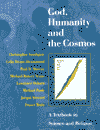Determinism, Indeterminism and Their ImplicationsNewtonian mechanics proved an enormously powerful way
of describing moving bodies. A century after Newton Pierre Simon de Laplace
(1749-1827) showed among other things how the solar system could have arisen
without divine intervention. It is enough to note here the conviction of many thinkers in this field that this is not a wholly determined world, but one in which the laws and processes God has created can give rise to novel structures through the operation of chance, and that God can co-operate with those developments, and relate to the conscious beings to which evolution has ultimately given rise. So Keith Ward writes: there can only be an open future if there
is a degree of indeterminism. There can only be the sort of freedom that is
morally important if there is an open future, at least sometimes. So
indeterminism is a necessary condition of the later development of morally
important freedom in rational beings.
Email
link | Feedback | Contributed by: Dr.
Christopher Southgate |




